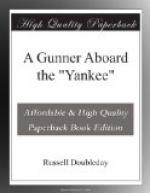To which we all said, Amen.
We separated from the “Marie,” and, as the “Yankee” was much the faster, she was soon lost to sight.
The anchor had no sooner been dropped in Guantanamo Bay than our captain went over to the “New York,” and then signals began to be displayed, and soon after all hands were hauling on the “cat falls.”
The skipper returned; the gig was pulled up to its place, and very soon we were ploughing the water in the open. As we went out, our prize came in.
It seems the encounter with the “Burton” was told to the admiral, and he at once ordered us to go out and get her.
We headed straight out. The black smoke poured out of the funnels; the ship shook with the pounding of the strained engines. The land faded from view.
About two o’clock we sighted the object of our chase, and it only required a blank shot from the forward six-pounder to bring her to.
The prize crew, consisting of six seamen, some firemen and engineers, and officered by Lieutenant Duncan, went over and took possession of our second prize in one day.
Captor and captive then turned and headed for Guantanamo.
The men were in high spirits. Speculation was rife as to the amount of prize money each would secure, and some even went so far as to plan the spending of it.
Every one felt very gay, and as if something should be done to celebrate our good fortune. We would have liked to spend some money for an entertainment, but that was impossible.
“Dick,” however, was impressed into service to furnish some amusement. “Dick,” a forecastle man, is a born story-teller, and we knew if we could get him started, some fun would be assured.
After some pressure he acquiesced, and began the following yarn:
“One day a certain Irishman, Mike Dooley by name, departed this life. He was much respected, and his death caused no little sorrow to his friends and neighbors. His wife and children were simply inconsolable. The widow wished to have a handsome funeral in his honor and spent her savings in furtherance of that plan. She had enough money for everything, except the silver inscription plate. But that difficulty was easily overcome, for ’What’s the matter wid Pat Molloy painting it nately in white paint?’ she said.
“Pat, being approached on the subject, expressed his entire willingness, and soon after called for the casket and took it away. He was told to letter the following, in neat, white letters: ’Michael Dooley departed this life in his prime, at the age of twenty-eight.’
“Pat was a bricklayer by trade, and painting was only a ‘side line’ with him.
“He started to put the inscription on the casket, and got along bravely till he came to ‘age of twenty-eight.’ Then he realized that he could not make the figures. He puzzled over it a long while, for he did not like to ask and thus show up his ignorance.




